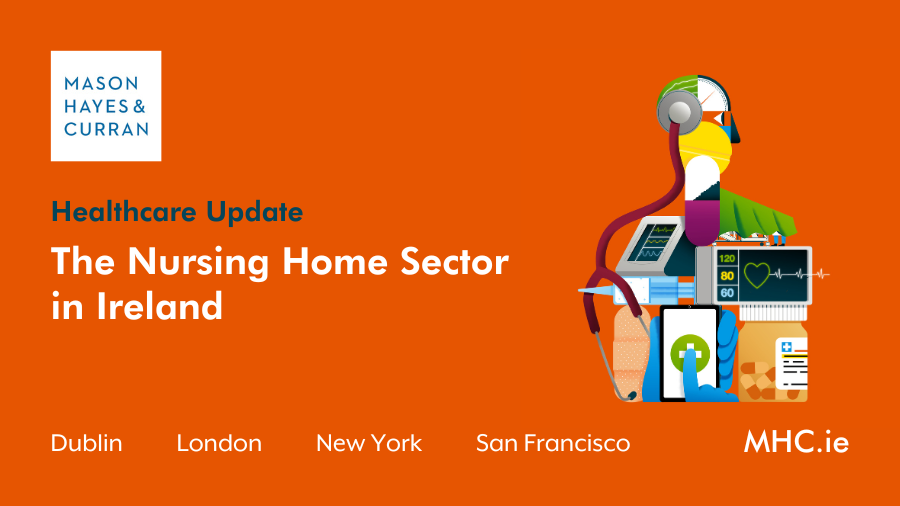The Nursing Home Sector in Ireland

During Nursing Home Week 2023 Eimear Lyons, Corporate Partner, looks back at the nursing home sector in Ireland over the last few months and considers the challenges facing registered providers of nursing homes, and the regulatory framework within which they operate. Also, with Budget 2024 on the horizon, she look at the proposed supports and reforms being considered by Government to address the crisis in the sector.
The challenges facing the nursing home sector in Ireland have been well publicised. In the last 12 months, the closure of nursing homes has been a significant concern for those working in the sector and for the residents and families availing of nursing home services.
Nursing Homes Ireland (NHI) is calling for an increase of €191 million in the Fair Deal budget to ensure the short-term viability of nursing homes and pause further closures. In addition, there are calls for an urgent review and reform of the Fair Deal scheme and to adopt a fit for purpose pricing mechanism which reflects the reality of care costs and fees payable under the scheme. [1]
While the nursing home sector in Ireland has undergone revolutionary consolidation in the last 3 years with nursing home groups now owning 40% of all private nursing home beds, activity in the market has slowed down in 2023 as a consequence of inflation and the deficiencies in the Fair Deal scheme.
It is projected that by 2031 Ireland’s population comprising those aged 65 years and over will be over 1,000,000[2]. It is hoped that the Government will avail of the opportunity to address the nursing home crisis in Budget 2024 so that the sector can recover and grow and meet the increasing demands for nursing home and domiciliary care.
Closures and new bed capacity
In 2022, 16 nursing home operators informed the Chief Inspector of the Health Information and Quality Authority (HIQA) of their intention to cease the business of operating a designated centre as set out in section 66 of the Health Act 2007 (the Act).
By the end of 2022, 12 of these nursing homes closed voluntarily, 1 centre was closed by the Chief Inspector under Section 51 of the Act, and 1 centre did not renew its registration. In 2022, bed capacity in nursing homes was reduced by 863 due to the closure of a designated centre or a reduction in the number of beds in an existing centre.
PwC have recently published an independent report on nursing homes in Ireland, “Challenges for Nursing Homes in the Provision of Older Persons Care - Private and Voluntary Nursing Home Sector”.[3] This report, published in May 2023, informed of 31 closures and NHI has advised that this number has since increased.[4]
While home closures have dominated the media in the last 12 months, there is some good news as the number of beds continues to increase. In 2022, 733 new nursing home beds became available through the registration of 4 new nursing homes and extensions in 25 existing nursing homes. The majority of the new beds were registered in counties Meath, Dublin, Louth, and Cork.
HIQA regulation
To operate a nursing home in Ireland, you must be registered as a “registered provider” with HIQA under Section 48 of the Act. The Act, together with the associated regulations and nationally mandated standards, particularly the National Quality Standards for Residential Care Settings for Older People in Ireland, provide the legal framework which supports the regulation of designated centres for older people, that is nursing homes, in Ireland and set out the minimum standards of care that must be provided for people living in nursing homes. Reporting to the Minister for Health, HIQA’s role is to ensure that nursing homes in Ireland are fit for purpose and meet the requirements set out in the regulations and the applicable standards for quality and safety.
COVID-19 was particularly challenging for residents and those operating and working in nursing homes with restrictions and increased reporting requirements. Since the pandemic, HIQA has adapted its regulatory model to effectively monitor the quality and safety of nursing home services and to respond to risk.
Registered providers and persons in charge are required to notify the Chief Inspector of HIQA of significant events that occur within 3 days and to notify of other specific matters that occur in the nursing home on a quarterly basis. In 2022, HIQA received 18,344 notifications, which was an increase from the number received in 2021.
Nursing home providers are also required to notify the Chief Inspector of HIQA of any outbreak of an infectious disease or any confirmed or suspected case of COVID-19 among staff or residents and in relation to any unexpected deaths. In 2022, HIQA was notified of 1,452 unexpected deaths among residents in nursing homes. This figure includes deaths resulting from COVID-19.
HIQA also receives unsolicited information from residents, relatives of residents and employees of nursing homes and others. This information generally relates to safeguarding, welfare issues, quality of case, governance and management and staffing issues. During 2022, HIQA received 978 pieces of feedback, a 4.5% increase on the number received in the previous 12 months. While HIQA has no regulatory responsibility to investigate or manage an individual complaint, the Chief Inspector reviews and risk rates the information received and assesses how a provider complies with their statutory obligations.
In 2022, HIQA carried out 726 inspections of 558 nursing homes which equated to 1,222 inspection days and the majority of these inspections were unannounced. A single inspection may be carried out by one or more inspectors over one or more days and a nursing home may receive one or more inspections a year. More inspections are necessary where there are concerns about the care and welfare of residents.
HIQA is increasingly active in fulfilling its inspection and enforcement roles. The impact of enforcement by HIQA in nursing homes which do not meet the required standards is not factored into the supply needs for nursing homes. While increasing the pressure on supply, poor or sub-optimal standard of accommodation is taken out of the system as a direct consequence of the increased regulatory environment.
Ownership and consolidation
Currently nursing home services in Ireland are provided via the public, voluntary and private sectors. Since 2019, the Irish private nursing home sector has experienced a transformational consolidation with private equity, international care home groups, and European funds investing in the sector. It is reported that 15 nursing home groups own 40% of all private nursing home beds.[5] As of 31 December 2022, the profile of ownership of nursing homes was as follows:
Provider Type |
Number of Centres |
Number of Beds |
Health Service Executive (Public) |
111 (20%) |
5,067 (16%) |
HSE – funded bodies under Section 38 and 39 of the Health Act 2004 |
17 (3%) |
921 (3%) |
Private providers |
429 (77%) |
25,662 (81%) |
Total |
557 |
31,650 |
While consolidation has slowed down for now, primarily because of inflation, gaps in valuation expectation, the increased regulation of room sizes, recruitment issues and the Fair Deal scheme challenges, additional bed capacity is needed urgently. If the Fair Deal scheme is reformed and other economic factors are stabilized, this would go a long way to encourage further consolidation and development in the sector.
Nursing homes support / Fair Deal scheme
The Nursing Homes Support Scheme (NHSS), or Fair Deal scheme as it is commonly known, offers financial support for those being cared for long-term in nursing homes, whether they are public, private or voluntary. The National Treatment Purchase Fund (NTPF) negotiates with private and voluntary nursing homes to reach an agreement on the maximum price that will be charged. A deed of agreement is agreed which sets one fee per nursing home irrespective of the individual care needs of the residents. This price is set for generally a 24-month period. Also, there is no ability to renegotiate the fee until the deed of agreement has expired.
The need to reform the Fair Deal scheme has been widely publicised in recent months. NHI reports that since 2017, weekly rates for the Fair Deal scheme for the private and voluntary sector have risen by just 3.1% a year.[6] It is considered that the NTPF’s rate setting mechanism can result in inconsistencies and fails to fully capture factors such as dependency mix and operating costs. In addition, the NTPF’s nursing home financial reviews are primarily based on historic financial data and do not consider the prospective financial year or rising costs. [7]
On 31 July 2023, NHI submitted its pre-budget submission for Budget 2024 to the Minister for Finance, Michael McGrath TD. In its submission, NHI is requesting:
- An increase of €191 million in the Fair Deal budget, which manifests in an additional €201 per resident per week, to bridge the gap between costs increases since 2017, and
- Reform of the Fair Deal scheme, whereby the pricing mechanism for Fair Deal rates are based on resource allocation that reflects individual residents’ care needs, and all the associated costs.
Also, in June 2023, an opposition party motion calling for immediate, short-term action to stem nursing home closures went unopposed. Further, the motion called for an urgent review of the Fair Deal pricing mechanism.
Conclusion
It is anticipated that there will be a number of reforms in this sector in the coming months which will, hopefully, go some way to address the current challenges being experienced by the sector and the need for more bed capacity to support the demands of Ireland’s aging population.
While nursing home services are critical in our communities, homecare and support is also an essential service which allows people remain in their own homes as long as possible. Currently, there is no statutory regulation of homecare and support services in Ireland and the Department of Health is developing a statutory scheme for home support to be underpinned by legislation and standards. HIQA is continuing to work closely with the Department of Health to support these developments and reform of the homecare sector is also expected.
If you are a registered provider of a nursing home or an investor in the healthcare sector in Ireland and would like further information, please contact a member of our Corporate or Healthcare teams.
Details in this article in relation to HIQA regulatory matters including inspections, bed capacity, closures and sector profile are based on HIQA’s Annual Report 2022 as published in June 2023 and available at https://www.hiqa.ie/reports-an...
[1] https://nhi.ie/call-for-additi...
[3] For further information on the PwC Report, please see https://www.mhc.ie/latest/insights/nursing-homes-report-regulatory-and-transactional-themes.
[4] https://nhi.ie/call-for-additi...
[5] https://www.independent.ie/iri...
Share this:



